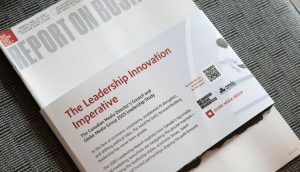Released yesterday, the Consumerology Report contains data gleaned from a national survey commissioned by Toronto agency Bensimon Byrne. The majority (57%) of respondents said they’re currently limiting their purchases because they’re worried about economic conditions and the rising cost of necessities.
If such worries increase, the report concludes, businesses can expect consumer spending in general to drop significantly. But that’s no reason for marketers to put the brakes on advertising, says agency president Jack Bensimon. ‘It’s important for companies to maintain their marketing spending despite an economic downturn,’ he tells MiC.
‘Numerous studies of various recessionary periods have demonstrated the value of maintaining ad expenditures despite economic weakness,’ he explains – citing, as one example, The Profit Impact of Market Strategy (PIMS) study conducted by the Strategic Planning Institute, which tracked an average gain of 1.5 share points for brands that increased expenditures during a recession.
‘There are three simple things marketers need to remember during an economic downturn,’ Bensimon advises.
‘Value: Marketers will need to tailor their message to accommodate shifting consumer expectations that surface when the economy slows. Consumers will buy if they believe a product to be worth the price. But keep in mind that value does not simply mean slashing prices. While price cuts can result in short-term gains, more often it leads to long-term market share erosion.
‘Many marketers are reviewing the short- and long-term impact of Taco Bell’s Value menu strategy in the early ’90s. Sales improved in the short term. But longer-term erosion of the core brand equities led to declining market share.
‘Innovation: If a product is truly innovative – or perceived to be – consumers will buy it regardless of the state of the economy. Discount brokerages, airline loyalty programs, CNN, MTV and the iPod were all launched during economic slumps.
‘Empowerment: During recessions, consumers can feel powerless, frustrated and anxious. Our Consumerology Report shows that 1 in 4 Ontarians (and 1 in 5 Canadians) is already concerned about becoming unemployed in the next year. In the face of this, brands that succeed will provide choices and propositions that give consumers some sense of control over their lives.’
And, Bensimon concludes, ‘Creatively, the advice is similar to the trends that have sustained Hollywood through economically weaker times. Give consumers more opportunities to laugh and escape the anxieties of everyday life.’
The Consumerology Report also found that:
• Although 75% of Canadians believe the country is on the right track today, only 62% believe the economy will be growing a year from now.
• Canadians cite the price of gasoline as one of the most important issues facing the country – second only to health care.
• The biggest spending trends are an increase in spending on ‘necessities,’ including food, gas and electricity, and a marked decrease in spending on ‘big-ticket items.’
• One-third of Canadians expect to pay more for groceries in the coming year, almost half (46%) expect to spend more on gasoline and just over one-third (36%) expect to spend more on electricity.
• 45% expect to spend less this year than last on furniture; 29% expect to spend less this year on clothing for themselves; 31% anticipate their spending on entertainment to decrease; and one-third expect to spend less on home repairs or renovations.
• 45% of Canadians do not have enough money each month for variable expenses.
• About one-third of Canadians making $75,000 or less come up short each month in terms of making fixed expenses, while about 10% of those earning $100,000 reported the same problem.
The complete report may be downloaded from www.bensimonbyrne.com/report.html.























